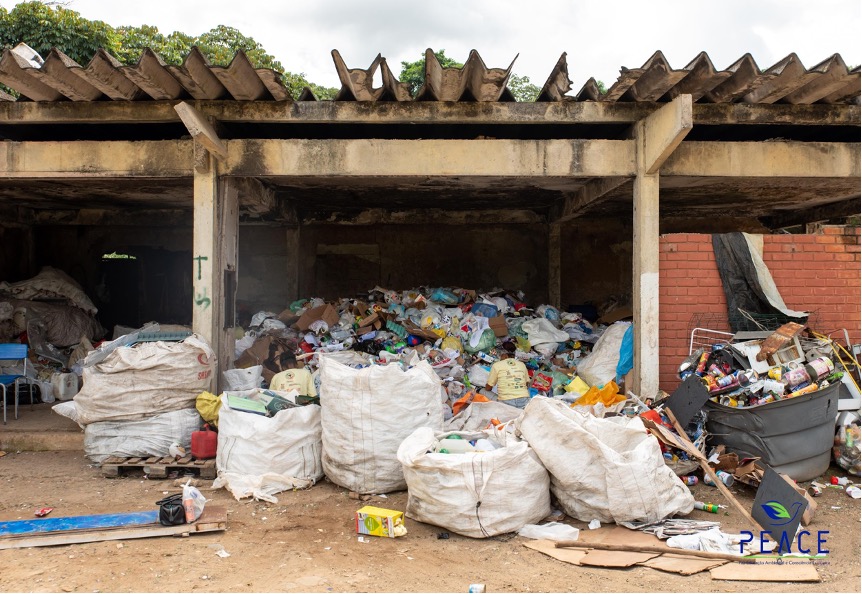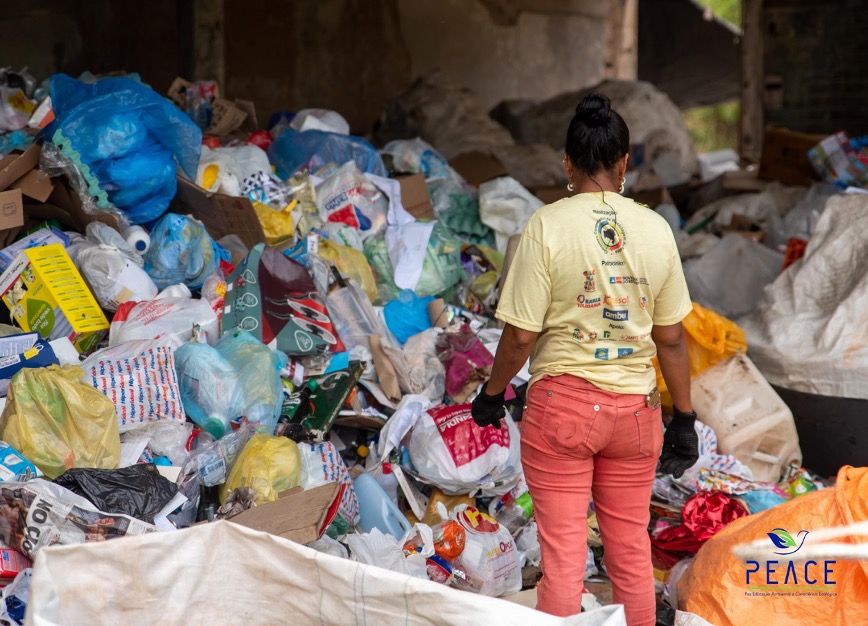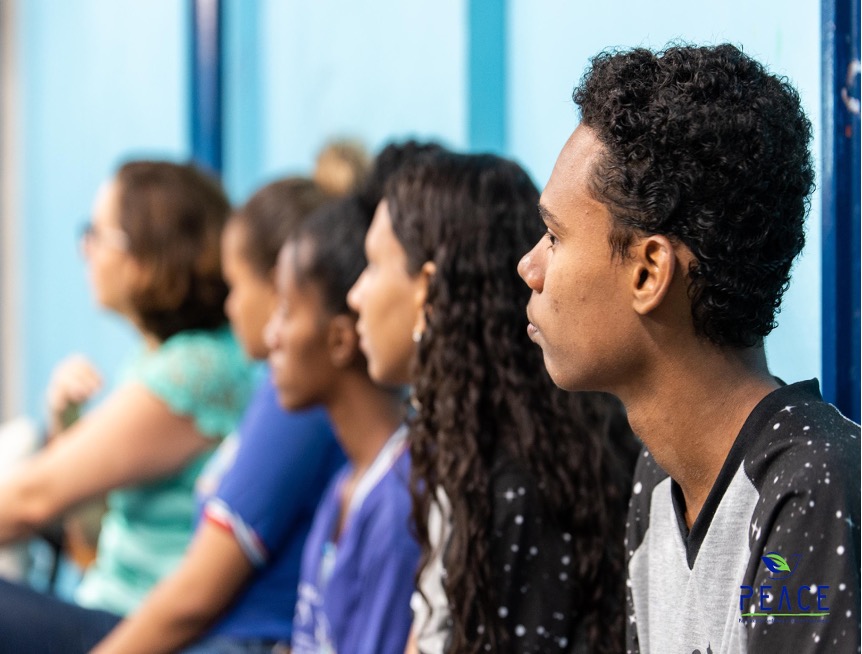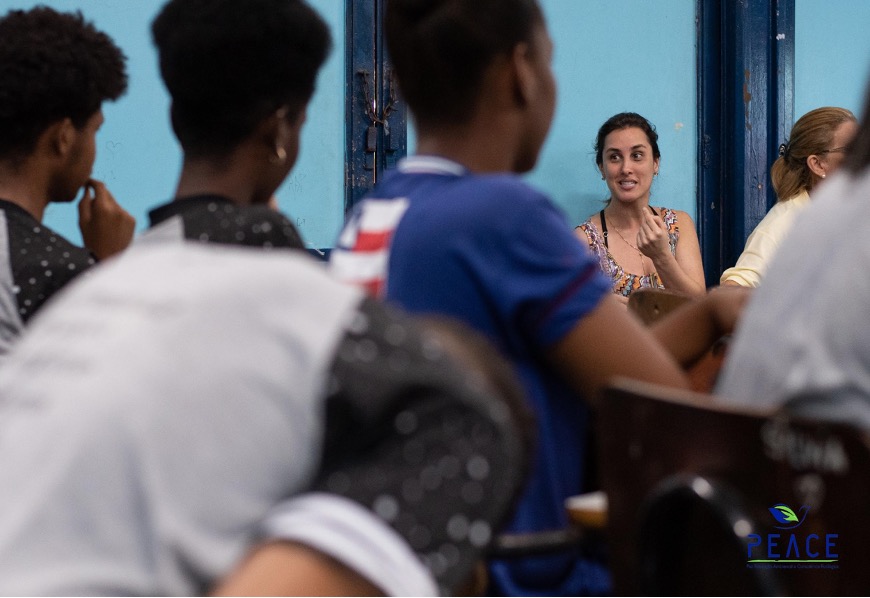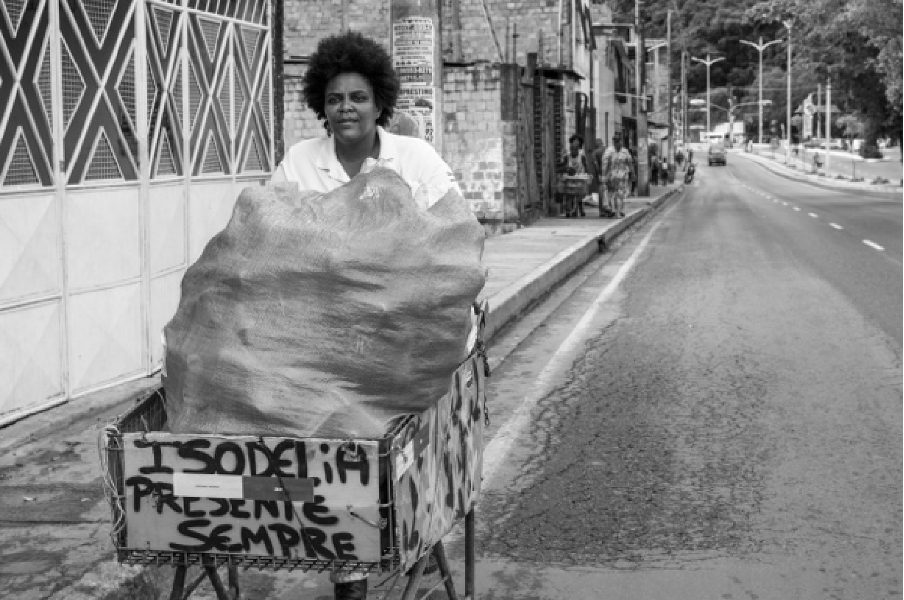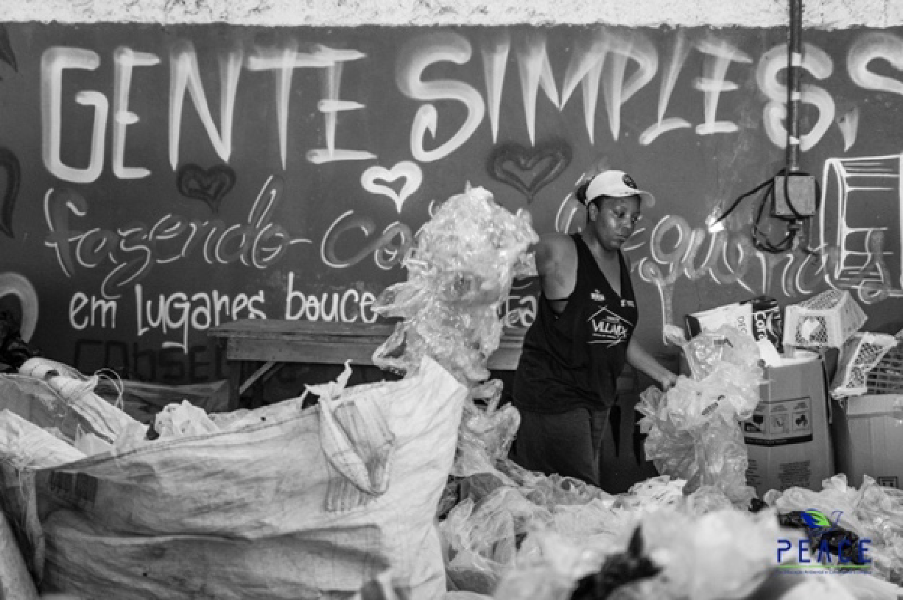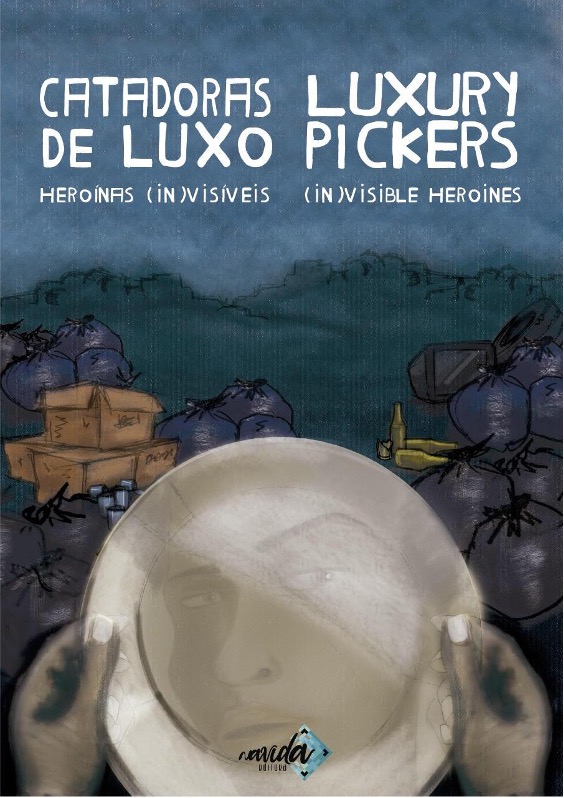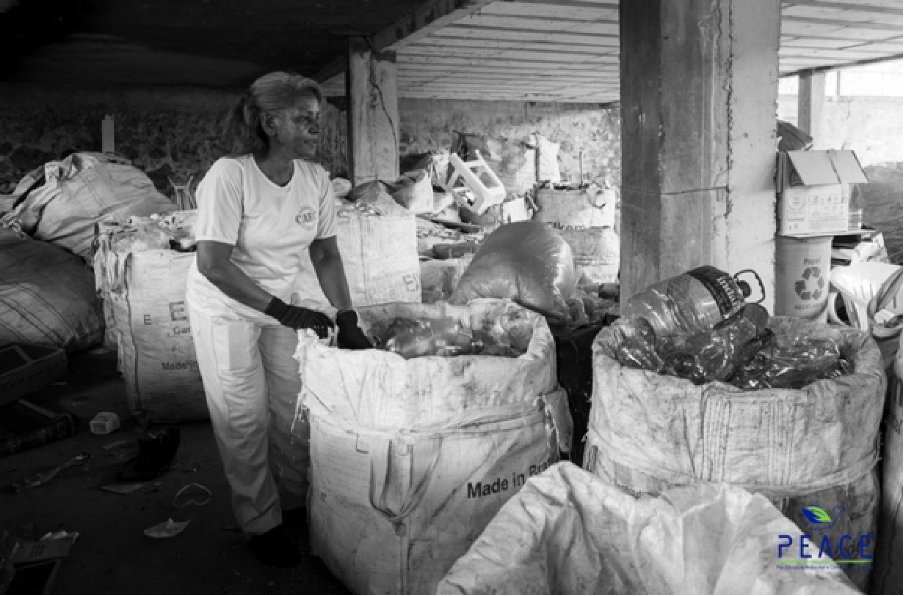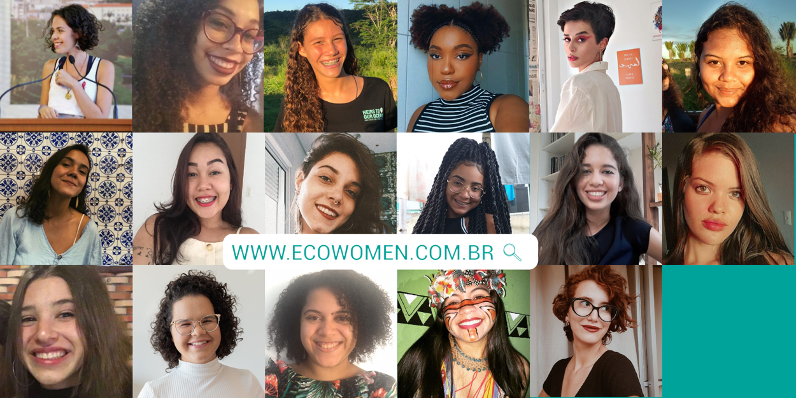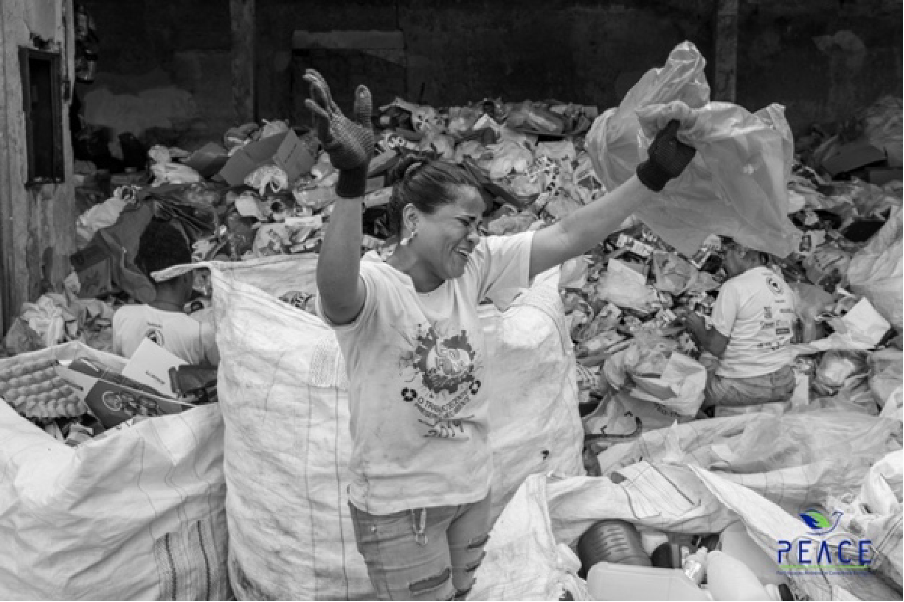Laíze Lantyer Luz (ELP 2021) | CEO, PEACE, Brazil
The history of the projects “Sustainable Schools”, “Luxury Pickers”, “EcoWOMEN” and the foundation of the organization PEACE (acronyms in Portuguese for Peace, Environmental Education and Ecological Awareness) are intertwined with all my national and international leadership as a citizen, teacher, researcher, lawyer and writer, but also very much influenced by my oldest memory related to garbage during my childhood. We lived far from that reality, but every weekend, when we went to the Magistrates' Mansion Social Club, we had to pass in front of the old garbage dump, located in the neighborhood of Canabrava (Salvador, Brazil). I vividly remember my parents rolling up the car windows and my anguish, closing my nose in an attempt not to smell that unbearable odor. I even held my breath and closed my eyes – as if one sense interfered with the other. I remember seeing through the car window many children, women, and elderly people interacting with that degradation in social form; and asking my family members what it was about that huge area that gave us so much relief after we walked through it. My grandfather's answer never left my mind: "That's our garbage pool!"
COOPERLIX, Salvador, Bahia, Brazil. June, 2019. By: Photographer Paul Donnelly
Garbage is a human production, so there is no way to think about garbage without thinking about people. In this context, especially in developing industrial societies, the best agents for solid waste are the collectors. Despite being made invisible, they live in precarious conditions and fight for the right to have rights, they dream of a different world. For this reason, addressing human rights issues and agendas and establishing strategies for achieving Sustainable Development without involving them in the process is, at the very least, a failure in the conduct of public policies.
Ivonete Anjos Ferreira de Sena. COOPERLIX, Salvador, Bahia, Brazil. June, 2019. By: Photographer Paul Donnelly
Over the years, when I was still very young, the academic excellence and leadership in the execution of social projects and actions led me to be selected by the US Embassy as a Young Ambassador of Brazil. The program proposed a cultural exchange in the US and return to Brazil to implement projects that impact the local community. Years later, I was named ambassador of the International Visitor Leadership Program, a professional program for leaders that resulted in the foundation of associations and institutions for social, environmental, and human rights causes built in networks in Brazil and abroad. One of these associations, the result of international dialogues, is Peace Environmental Education and Ecological Awareness (translation for PEACE: Paz Educação Ambiental e Consciência Ecológica), which has promoted three major projects in the city of Salvador and all over Brazil: “Sustainable Schools”, “Luxury Pickers: (in)visible heroines”, and "EcoWOMEN".
The “Sustainable Schools” project works with workshops, competitions, and fun activities on sustainable development as a key to understanding the connection between human rights and the environment. A principle that goes far beyond pure and simple growth, as it encompasses the social, cultural, and economic development of human beings recognized in their differences and potential (developed by formal and informal education).
Rômulo Almeida Public High School. Salvador, Bahia, Brazil. May, 2019 By: Photographer Paul Donnelly
The projects aim to educate the population about the management of urban solid waste services as an important tool for the continuous improvement of social and environmental conditions. The growing wrongful disposal of these wastes has been the subject of frequent debates between the private sector, the State, and organized civil society, given its great environmental impacts and, consequently, in the life of humanity. An increasingly recurrent discussion is how to deal with the increase in the final disposal of waste produced by organizations and society, aiming at the sustainability suggested by conferences supported by UN Habitat and by UN Agenda 30. However, for (economically) developing countries like Brazil, this is not an easy task.
Rômulo Almeida Public High School. Salvador, Bahia, Brazil. May, 2019. By: Photographer Paul Donnelly
In September 2015, the United Nations Summit on Sustainable Development took place. At the end of the meeting, the UN published a document with "17 goals to transform the world" and the organization works towards a collective, coherent, and integrated response to national priorities and needs around what the agency called Agenda 30 - the Sustainable Development Goals (SDGs). It is important to emphasize that three of the seventeen SDGs are related to urban solid waste. In this sense, it is noted that the objective of the PNRS (acronym in Portuguese for the National Solid Waste Policy) regarding the inclusion of recyclable material collectors in tasks related to the life cycle of products, fits into Objective 11, which aims to make cities and human settlements inclusive, safe, resilient, and sustainable.
Annemone Santos da Paz. Platform, Salvador, Bahia, Brazil. May 30, 2019. By: Photographer Paul Donnelly
During my Master's Degree in Social Policies and Citizenship at UCSAL (Catholic University of Salvador), I could see from field research with recyclable and reusable material collectors in the city of Salvador that most of these women are black, illiterate, marginalized, and invisible. This investigation was framed by the photographic exhibition and the documentary “The Luxury Pickers: (in)visible heroines”, both artifices to/for awareness and environmental education of society through art.
Núbia dos Santos Gomes. COOPERBRAVA, Canabrava, Salvador, Bahia, Brazil. May, 2019.
By: Photographer Paul Donnelly
As a result of my studies and research, in 2020 I published a book entitled “The Right to Sustainable Emancipation or Human Obsolescence? Luxury waste pickers in a Zero-Waste Society”. The objective of this book is to offer a contribution to the critique of a society that seeks to achieve the Zero-Waste goal, to analyze the contradictions of the Zero-Waste movement in promoting the right to citizenship of waste pickers, and as specific objectives to demonstrate the peculiarities of Brazilian environmental legislation in relation to the development/growth binomial. The photographs from the exhibition, as well as the account of the main excerpts from the interviews, are part of the book of photographs of “The Luxury Pickers: (in)visible heroines” scheduled to be released by the end of 2021. A link to the book can be found here: https://lnkd.in/dQ8emV34
The world population, especially the Brazilian, has not cared about the separation of the garbage it produces. This arduous task is assigned to the country's garbage collectors, which are mostly women. If this essential group went on strike, the ecosystem would collapse. These women are as invisible as a microscopic virus. They did not study medicine, nursing, or psychology, but they are heroines. Despite worldwide collaboration in combating the invisible, a certain degree of indifference and environmental illiteracy among the population still prevails.
Sônia Santos. CAEC, Canabrava, Salvador, Bahia, Brazil. June, 2019. By: Photographer Paul Donnelly
The EcoWOMEN project emerged in 2020 as a multidisciplinary educational project, which proposes to echo women's voices for their human, ecological, and economic rights in light of the social, environmental, cultural, and educational problems in the world after the COVID-19 pandemic through a multitude of social projects throughout Brazil. Through classes, workshops, and tutoring, topics like sustainability and entrepreneurship, women and human rights, arts, literature and culture, conflict management, and emotional intelligence are covered. In addition, the EcoWOMEN guidelines are based on the 17 Sustainable Development Goals, in view of the 2030 Agenda, a global action plan proposed by the United Nations (UN). The first edition was conceived in 2020 and formally consolidated 17 social initiatives, prepared by selected Young Ambassadors. For this, we built a support network formed entirely by women that totaled more than 80 participants. Furthermore, this journey was also provided by the speaker Ambassadors, subdivided into mentors, multipliers and honorary. In this sense, the activities were carried out through online platforms, in view of the pandemic context.
EcoWomen Youth Ambassadors 2020
Why ECO?
To talk about EcoWOMEN, it’s essential to talk about the word "Eco". Etymologically, Eco has the meaning of home, shelter... And its prefix often refers to the environment - which is our main home. This can be seen in words like ecology, ecotourism, ecosystem. We need to take care of everything that welcomes us, do you agree? This is valid in the shelter of a hug, to our room, the house we live in, our community, the city, the country, even the planet.
In the dictionary, echo is a masculine noun that denotes the repetition of a sound. In the figurative sense, it means news that spreads quickly, something that leaves marks, memory, repercussion, great bang. Astronomy, on the other hand, defines echo as bodies, as a process of distances between celestial stars, through radiofrequency reflection. And, considering each woman as a star, EcoWOMEN’s proposal is to build bridges in a world of many walls. It’s to create a network without borders, bringing together voices in a systemic echo.
Gathering voices is necessary!
Women, for some time now, seem to have become women of words scavenged, sung, and counted - by the dropper. Most of them were created under the trend that it is necessary to remain silent in the face of violence and sexism in the world. Historically, men have dictated narratives about women, in books and articles about them. That can't happen anymore.
We are the majority…
However, despite remembering and studying philosophers such as Socrates, Plato, and Aristotle, many of us do not even know who Hypatia was, who taught Mathematics, Philosophy, Astronomy...
We are the majority, but we need projects to encourage more girls in music. Why?
We are a majority, but we need encouragement to have more female scientists. Why?
We are a majority, but fashion rules are dictated by safety standards of what we should wear so that we are not victims of harassment. Why?
We are the majority, but we are not occupying the National Congress. Why?
We are the majority, but we are not occupying the Presidency of the Republic. Why?
The reason is simple: because we are women. And women are inquisitive. And questioning women have historically been burned at the stake as witches. And that can't happen anymore.
What can you do for the future today?
There's a phrase from a great woman, Honorable Ambassador of the EcoWOMEN project, waste picker, without a master's or doctor’s degree, but wise in the art of smiling, listening, and consequently, living together: “When everything seems to go wrong, good things happen that they wouldn't have happened if everything had gone well!”.
Ivonete Anjos Ferreira de Sena. COOPERLIX, Salvador, Bahia, Brazil. June, 2019. By: Photographer Paul Donnelly
We know that our journey together on this planet is more important than our titles. The lesson of virtual and face-to-face coexistence that we are all facing is of a much larger dimension. Time is for learning.
The intention is that the images and voices of these environmental agents and women leaders can echo, raise awareness, and educate. May we know how to use the covid lesson as an invitation to look inside all the internal garbage that we keep and that makes us sick every day.
What we lack is to see the (in)visible and the Other with the eyes of the Soul and ask ourselves: what can I do for the future today?
Link to the “The Right to Sustainable Emancipation or Human Obsolescence? Luxury waste pickers in a Zero-Waste Society” Book: https://lnkd.in/dQ8emV34
Notes:
2. To watch the documentary:https://www.youtube.com/watch?v=cZGeT0KLv_Y
3. EcoWomen website: https://ecowomen.com.br/ecowomen-english-ok/
4. EcoWomen documentary: https://www.youtube.com/watch?v=nNyA849Z1Pc&t=7

